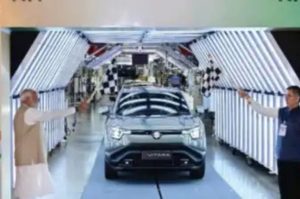Maruti Suzuki Exports: In a significant milestone for India’s automotive sector, Maruti Suzuki has officially exported its first batch of e-Vitara electric SUVs to Europe, marking a turning point in the country’s electric vehicle (EV) journey. The shipment underscores not only the automaker’s global ambitions but also India’s potential to emerge as a strong hub for EV manufacturing and exports in the coming years.
India’s Largest Carmaker Steps into Global EV Arena
Maruti Suzuki, India’s leading car manufacturer, has long been the backbone of the domestic automobile industry. Its latest move into electric mobility with the e-Vitara shows a clear shift in strategy to align with global trends in clean transportation. The export of the first batch to Europe — a region that has already embraced EV adoption at a rapid pace — sends a strong signal that Indian-made EVs are ready to compete on the world stage.
According to company sources, the first shipment includes units manufactured at the Gujarat facility, one of Maruti Suzuki’s most advanced plants. The choice of Europe as the first export destination also reflects the company’s confidence in meeting stringent international standards on emissions, safety, and performance.

Maruti Suzuki Exports: Why the e-Vitara Matters
The e-Vitara is Maruti Suzuki’s electric avatar of the popular Vitara SUV, redesigned with advanced battery packs, modern features, and a focus on affordability compared to global competitors. It comes at a time when global EV demand is accelerating, driven by climate goals, government incentives, and changing consumer preferences.
By exporting this model to Europe, Maruti Suzuki aims to position itself as a serious contender in the EV market, not just domestically but globally. Analysts suggest that the move is strategically timed, as Europe continues to tighten regulations on fossil fuel cars while providing strong incentives for EV adoption.
India’s EV Export Potential
India has been steadily working to strengthen its position in the EV supply chain. With the government’s Make in India initiative, combined with Production-Linked Incentive (PLI) schemes for advanced battery manufacturing, the country is slowly carving out its space in the global EV market.
Maruti Suzuki’s export milestone could inspire other domestic automakers, such as Tata Motors and Mahindra Electric, to increase their focus on international EV sales. Already, India has been exporting some volumes of EVs and hybrid vehicles to markets in Asia and Africa. However, Europe represents a far more competitive and prestigious market, where global players like Tesla, Volkswagen, and Hyundai dominate.
External link (EV adoption in India):
https://www.niti.gov.in
Competition and Global Context
While Maruti Suzuki has been cautious about launching EVs in India compared to rivals like Tata Motors, its international foray indicates a carefully calibrated strategy. Tata Motors currently leads India’s EV passenger vehicle market with models like the Nexon EV and Tigor EV, while Maruti has chosen to perfect its offering for export-first markets before large-scale domestic rollout.
Europe, meanwhile, remains one of the largest EV markets globally, with countries like Norway, Germany, and the UK leading the transition. Exporting to such markets means Maruti Suzuki’s e-Vitara must stand shoulder-to-shoulder with globally established models in terms of range, performance, and safety.
External link (European EV market):
https://www.iea.org/reports/global-ev-outlook-2024
Boost to India’s Economy and Global Image
The export of the e-Vitara also carries broader economic and diplomatic implications. By becoming a part of the global EV ecosystem, India projects itself as a green technology contributor, not just a consumer. This aligns with India’s climate commitments under the Paris Agreement and its ambitious target of achieving net-zero emissions by 2070.
Additionally, auto exports contribute significantly to India’s foreign exchange earnings. With EVs expected to dominate global sales in the coming decade, Maruti Suzuki’s move could pave the way for India to become a leading EV exporter in Asia.
External link (Government of India – EV Mission):
https://www.education.gov.in/ev-mobility
What It Means for Indian Consumers
While the e-Vitara has been shipped to Europe first, questions remain about its availability in the Indian market. Consumers in India, who have long associated Maruti Suzuki with affordability and reliability, are eagerly awaiting the company’s EV debut at home. Industry insiders suggest that Maruti may launch the e-Vitara in India in 2025, after studying consumer demand, charging infrastructure, and government policy clarity.
This staggered strategy allows Maruti Suzuki to test its EV in advanced markets before scaling up production for India, where EV adoption is still in a nascent stage due to concerns over charging infrastructure, range anxiety, and price sensitivity.
External link (EV infrastructure in India):
https://powermin.gov.in
Industry Reactions
Experts have welcomed Maruti Suzuki’s move as a game-changer for India’s auto sector. Automobile analysts believe that if the e-Vitara performs well in Europe, it will build trust in Indian-made EVs worldwide. This could attract investments in the EV supply chain, including battery technology, charging networks, and renewable energy integration.
Looking Ahead
Maruti Suzuki’s export of the first batch of e-Vitara EVs is more than just a corporate milestone — it is a symbol of India’s evolving role in the clean mobility revolution. While challenges remain, including domestic EV adoption hurdles and global competition, the successful reception of the e-Vitara in Europe could chart a new course for India’s automotive future.
With the government pushing for rapid EV adoption and companies like Maruti Suzuki stepping onto the global stage, the next decade could well belong to India in the green mobility race.
External link (Global EV transition):
https://www.weforum.org/agenda/2024/05/global-electric-vehicles-future
Also read: Home | Channel 6 Network – Latest News, Breaking Updates: Politics, Business, Tech & More

